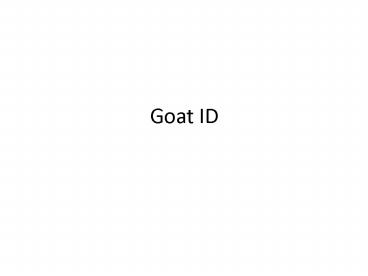Goat ID - PowerPoint PPT Presentation
1 / 22
Title:
Goat ID
Description:
Goat ID What are common types of goats, ... Cashmere goats have been developed by selective breeding. Cashmere is the soft undercoat of fine down produced by goats. – PowerPoint PPT presentation
Number of Views:165
Avg rating:3.0/5.0
Title: Goat ID
1
Goat ID
2
What are common types of goats, and how do they
differ?
- A. Angora goats originated in Turkey and are well
adapted to areas not fit for other livestock. - Angoras are almost totally white at maturity and
produce up to 7 pounds of mohair each year. - Angora goats are horned, with long, droopy ears.
- At maturity a buck weighs between 125 and 175
pounds, and a doe weighs between 80 and 90 pounds.
3
Goats Angora
4
What are common types of goats, and how do they
differ?
- B. Dairy goats
- The most common breeds raised in the United
States, in order of their popularity, are French
Alpine, LaMancha, Nubian, Saanen, and Toggenburg. - 1. French Alpine goats are known as good milkers
and have no distinct color. - However, they are commonly shades of fawn, gray,
brown, red, and black, or combinations of these
colors. - This breed has short hair. French Alpines are
larger-sized goats with a rangy look.
5
French Alpine
6
What are common types of goats, and how do they
differ?
- 2. LaMancha goats are known for their external
ears. - Two typesthe gopher ear and the elf earare
distinctive breed characteristics. - This breed has high milk production.
7
Lamancha
8
Nubian
- 3. Nubian goats are all-purpose
goats, useful for meat, milk, and
hide production. - They are not heavy milk producers, but their milk
has a high-average butterfat content. - Nubian goats have long ears.
9
Nubian
10
What are common types of goats, and how do they
differ?
- 4. Saanen goats originated in Switzerland.
- They are known as heavy milk producers.
- Saanen goats are white or light cream in color,
with white preferred. - The hair should be short and fine.
- Saanens perform best in cooler conditions.
11
Sannen
12
Toggenburg
- 5. Toggenburg goats are a medium-sized
breed from Switzerland. - They are known to be the oldest credited dairy
goat breed. - Toggenburg goats have excellent udder development
and high milk production. - The color is solid, varying from light fawn to
dark chocolate. - Toggenburgs have erect ears.
13
Toggenburg
14
Dairy Goats
15
What are common types of goats, and how do they
differ?
- 1. Boer goats came from South Africa and made
their first appearance to the United States in
1993. - Boer goats are known for their rapid growth rate,
excellent carcass qualities, and adaptability. - They have white bodies with red heads.
- This breed has grown in popularity among FFA and
4-H projects, as well as in the show ring.
16
Meat Goat Boer (boar)
17
What are common types of goats, and how do they
differ?
- D. Cashmere goats have been developed by
selective breeding. - Cashmere is the soft undercoat of fine down
produced by goats. - There is usually a large demand for cashmere
since it is in short supply. - Solid-colored goats are preferred in cashmere
production, but multicolored goats are also used.
18
Cashmere
19
Pygmy
- E. Pygmy goats were originally imported from
Africa. - They are only 16 to 23 inches tall at the withers
and have horns. - They can be any color or combination of colors.
- The main uses of pygmy goats are for research, as
pets, as 4-H and FFA projects, and in zoo
exhibits.
20
Pygmy
21
Oberhasli
- Does (females) may be pure black or chamoisee
while bucks (males) may only be registered if
they display correct chamoisee coloring.
Chamoisee is defined as bay (light to dark
reddish brown) with black points (two black
stripes starting above the eyes extending down
the face to merge to a black muzzle, a black
dorsal stripe, black lower legs, belly, and a
gray to black udder).
22
Obherasli

